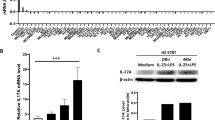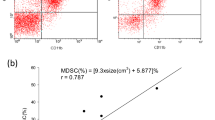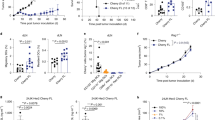Abstract
Dendritic cell (DC) expansion is regulated by the hematopoietic growth factor fms-like tyrosine kinase 3 ligand (Flt3L). DCs are critical to the control of tumor growth and metastasis, and there is a positive correlation between intratumoral DC infiltration and clinical outcome. In this report, we first demonstrate that single intravenous (i.v.) injections of adenovirus (Adv)-Flt3L significantly increased splenic dendritic, B, T and natural killer (NK) cell numbers in both normal and mammary tumor-bearing mice. In contrast, the numbers of DCs and T cells infiltrating the tumors were not increased. Consistent with the minimal effect on immune cell infiltration, i.v. Adv-Flt3L injections had no therapeutic activity against orthotopic mammary tumors. In addition, we noted tumor and Adv-Flt3L expansion of Gr1+CD11b+ immature myeloid suppressor cells (IMSCs), which may inhibit the therapeutic efficacy of Adv-Flt3L-expanded DCs.
This is a preview of subscription content, access via your institution
Access options
Subscribe to this journal
Receive 12 print issues and online access
$259.00 per year
only $21.58 per issue
Buy this article
- Purchase on Springer Link
- Instant access to full article PDF
Prices may be subject to local taxes which are calculated during checkout




Similar content being viewed by others
References
Hannum C, Culpepper J, Campbell D, McClanahan T, Zurawski S, Bazan JF et al. Ligand for FLT3/FLK2 receptor tyrosine kinase regulates growth of haematopoietic stem cells and is encoded by variant RNAs. Nature 1994; 368: 643–648.
Lyman SD, James L, Vanden Bos T, de Vries P, Brasel K, Gliniak B et al. Molecular cloning of a ligand for the flt3/flk-2 tyrosine kinase receptor: a proliferative factor for primitive hematopoietic cells. Cell 1993; 75: 1157–1167.
Gabbianelli M, Pelosi E, Montesoro E, Valtieri M, Luchetti L, Samoggia P et al. Multi-level effects of flt3 ligand on human hematopoiesis: expansion of putative stem cells and proliferation of granulomonocytic progenitors/monocytic precursors. Blood 1995; 86: 1661–1670.
Robinson S, Mosley RL, Parajuli P, Pisarev V, Sublet J, Ulrich A et al. Comparison of the hematopoietic activity of flt-3 ligand and granulocyte-macrophage colony-stimulating factor acting alone or in combination. J Hematother Stem Cell Res 2000; 9: 711–720.
Pulendran B, Banchereau J, Burkeholder S, Kraus E, Guinet E, Chalouni C et al. Flt3-ligand and granulocyte colony-stimulating factor mobilize distinct human dendritic cell subsets in vivo. J Immunol 2000; 165: 566–572.
Morse MA, Nair S, Fernandez-Casal M, Deng Y, St Peter M, Williams R et al. Preoperative mobilization of circulating dendritic cells by Flt3 ligand administration to patients with metastatic colon cancer. J Clin Oncol 2000; 18: 3883–3893.
Parajuli P, Mosley RL, Pisarev V, Chavez J, Ulrich A, Varney M et al. Flt3 ligand and granulocyte-macrophage colony-stimulation factor preferentially expand and stimulate different dendritic cell and T cell subsets. Exp Hematol 2001; 29: 1185–1193.
Maraskovsky E, Daro E, Roux E, Teepe M, Maliszewski CR, Hoek J et al. In vivo generation of human dendritic cell subsets by Flt3 ligand. Blood 2000; 96: 878–884.
Mosca PJ, Hobeika AC, Colling K, Clay TM, Thomas EK, Caron D et al. Multiple signals are required for maturation of human dendritic cells mobilized in vivo with Flt3 ligand. J Leukoc Biol 2002; 72: 546–553.
Mosley RL, Parajuli P, Pisarev V, Chavez J, Meeks A, Steffel A et al. Flt3 ligand augmentation of T cell mitogenesis and expansion of type 1 effector/memory T cells. Int Immunopharmacol 2002; 2: 925–940.
Maraskovsky E, Brasel K, Teepe M, Roux ER, Lyman SD, Shortman K et al. Dramatic increase in the numbers of functionally mature. J Exp Med 1996; 184: 1953–1962.
Brasel K, McKenna HJ, Morrissey PJ, Charrier K, Morris AE, Lee CC et al. Hematologic effects of flt3 ligand in vivo in mice. Blood 1996; 88: 2004–2012.
Williams NS, Moore TA, Schatzle JD, Puzanov IJ, Sivakumar PV, Zlotnik A et al. Generation of lytic natural killer 1.1+, Ly-49- cells from multipotential murine bone marrow progenitors in a stroma-free culture: definition of cytokine requirements and developmental intermediates. J Exp Med 1997; 186: 1609–1614.
Yu H, Fehniger TA, Fuchshuber P, Thiel KS, Vivier E, Carson WE et al. Flt3 ligand promotes the generation of a distinct CD34(+) human natural killer cell progenitor that responds to interleukin-15. Blood 1998; 92: 3647–3657.
McKenna HJ, Stocking KL, Miller RE, Brasel K, De Smedt T, Maraskovsky E et al. Mice lacking flt3 ligand have deficient hematopoiesis affecting hematopoietic progenitor cells, dendritic cells, and natural killer cells. Blood 2000; 95: 3489–3497.
He Y, Pimenov AA, Nayak JV, Plowey J, Falo Jr LD, Huang L . Intravenous injection of naked DNA encoding secreted flt3 ligand dramatically increases the number of dendritic cells and natural killer cells in vivo. Hum Gene Ther 2000; 11: 547–554.
Chen K, Braun S, Lyman S, Fan Y, Traycoff CM, Wiebke EA et al. Antitumor activity and immunotherapeutic properties of Flt3-ligand in a murine breast cancer model. Cancer Res 1997; 57: 3511–3516.
Pawlowska AB, Hashino S, McKenna H, Weigel BJ, Taylor PA, Blazar BR . In vitro tumor-pulsed or in vivo Flt3 ligand-generated dendritic cells provide protection against acute myelogenous leukemia in nontransplanted or syngeneic bone marrow-transplanted mice. Blood 2001; 97: 1474–1482.
Sang H, Pisarev V, Chavex J, Robinson S, Guo Y, Hatcher L et al. Murine mammary adenocarcinoma cells transfected with p53 and/or Flt3L induce antitumor immune responses. Cancer Res 2005; 12: 427–437.
McNeel DG, Knutson KL, Schiffman K, Davis DR, Caron D, Disis ML . Pilot study of an HLA-A2 peptide vaccine using flt3 ligand as a systemic vaccine adjuvant. J Clin Immunol 2003; 23: 62–72.
Parajuli P, Pisarev V, Sublet J, Steffel A, Varney M, Singh R et al. Immunization with wild-type p53 gene sequences coadministered with Flt3 ligand induces an antigen-specific type 1 T-cell response. Cancer Res 2001; 61: 8227–8234.
Disis ML, Rinn K, Knutson KL, Davis D, Caron D, dela RC et al. Flt3 ligand as a vaccine adjuvant in association with HER-2/neu peptide- based vaccines in patients with HER-2/neu-overexpressing cancers. Blood 2002; 99: 2845–2850.
Evans TG, Hasan M, Galibert L, Caron D . The use of Flt3 ligand as an adjuvant for hepatitis B vaccination of healthy adults. Vaccine 2002; 21: 322–329.
Miller G, Pillarisetty VG, Shah AB, Lahrs S, DeMatteo RP . Murine Flt3 ligand expands distinct dendritic cells with both tolerogenic and immunogenic properties. J Immunol 2003; 170: 3554–3564.
Li Q, Pan PY, Gu P, Xu D, Chen SH . Role of immature myeloid Gr-1+ cells in the development of antitumor immunity. Cancer Res 2004; 64(3): 1130–1139.
Kusmartsev S, Gabrilovich DI . Role of immature myeloid cells in mechanisms of immune evasion in cancer. Cancer Immunol Immunother 2005; 27: 1–9.
Aslakson CJ, Miller FR . Selective events in the metastatic process defined by analysis of the sequential dissemination of subpopulations of a mouse mammary tumor. Cancer Res 1992; 52: 1399–1405.
Murphy BO, Joshi S, Kessinger A, Reed E, Sharp JG . A murine model of bone marrow micrometastasis in breast cancer. Clin Exp Metastasis 2002; 19: 561–569.
Pulendran B, Smith JL, Caspary G, Brasel K, Pettit D, Maraskovsky E et al. Distinct dendritic cell subsets differentially regulate the class of immune response in vivo. Proc Natl Acad Sci USA 1999; 96: 1036–1041.
Fugier-Vivier IJ, Rezzoug F, Huang Y, Graul-Layman AJ, Schanie CL, Xu H et al. Plasmacytoid precursor dendritic cells facilitate allogeneic hematopoietic stem cell engraftment. J Exp Med 2005; 201: 373–383.
Kusmartsev S, Gabrilovich DI . Inhibition of myeloid cell differentiation in cancer: the role of reactive oxygen species. J Leukoc Biol 2003; 74: 186–196.
Acknowledgements
We gratefully acknowledge the assistance of the University of Nebraska Medical Center Cell Analysis Facility and Animal Facility. This work was supported by the Nebraska Research Initiative Programs in Molecular Therapeutics and Clinical Translation of Biotechnology (JET, RKS, and JCS), and by an Eppley Cancer Center Grant (JCS). AJR was supported by a DOD Breast Cancer Training Program postdoctoral fellowship (DAMD 17-00-1-0361), and AEA received support from a UNMC Graduate Studies Research Assistantship.
Author information
Authors and Affiliations
Corresponding author
Rights and permissions
About this article
Cite this article
Solheim, J., Reber, A., Ashour, A. et al. Spleen but not tumor infiltration by dendritic and T cells is increased by intravenous adenovirus-Flt3 ligand injection. Cancer Gene Ther 14, 364–371 (2007). https://doi.org/10.1038/sj.cgt.7701018
Received:
Accepted:
Published:
Issue Date:
DOI: https://doi.org/10.1038/sj.cgt.7701018
Keywords
This article is cited by
-
Acute effects of FLT3L treatment on T cells in intact mice
Scientific Reports (2022)
-
Hepatic stellate cells promote tumor progression by enhancement of immunosuppressive cells in an orthotopic liver tumor mouse model
Laboratory Investigation (2014)
-
History of myeloid-derived suppressor cells
Nature Reviews Cancer (2013)
-
Attenuation of vaccinia virus by the expression of human Flt3 ligand
Virology Journal (2010)
-
Myeloid-derived suppressor cells in mammary tumor progression in FVB Neu transgenic mice
Cancer Immunology, Immunotherapy (2010)



